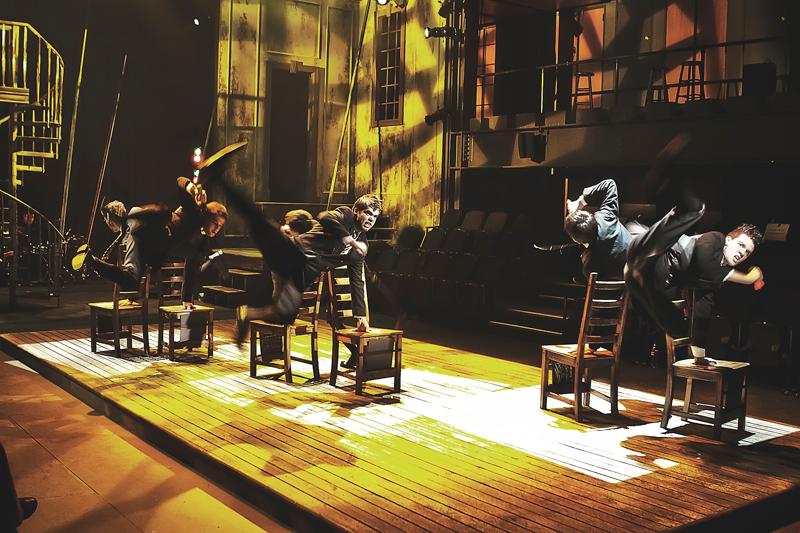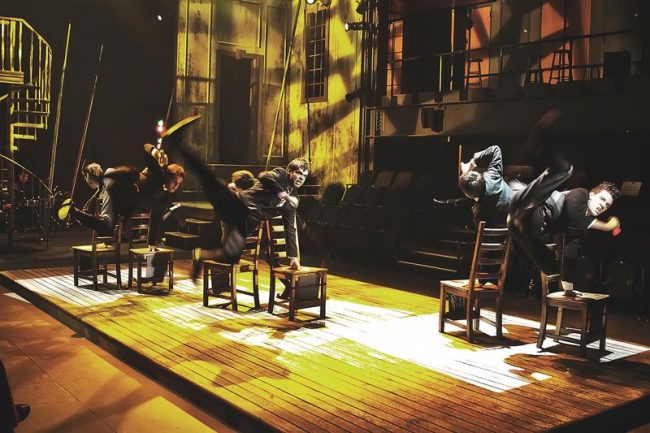
Cast Members of WaterTower Theatre’s “Spring Awakening” perform a musical and dance number involving chairs and daring acrobatic moves. (Courtesy of WaterTower Theatre)
Frank Wedekind’s “Spring Awakening,” one of the most controversial shows of its time, premiered to the public in 1906. The play deals with controversial topics including sexuality, abuse and abortion, and wasn’t even shown uncensored in English until 1974.
However, the La Jolla Playhouse took this taboo piece of theater in 1999 and transformed it into the eight-time Tony award winning musical that is considered the musical of this generation. “Spring Awakening” is not your typical Broadway musical.
Sex is simulated on stage and there are themes of suicide, child abuse and even masturbation.
WaterTower Theatre’s production, under the direction of Terry Martin, takes what some consider to be a crass and lewd show about depressed sex-crazed teens and transforms into a cutting, raw exposition of the no-holds-barred coming-of-age story.
The story, set in a German town in the 1890’s, focuses on the relationship that develops between main characters Melchior (Jonathan W. Gilland), and Wendla (Erica Harte) as they question their bodies and the feelings they have for each other.
Gilland’s voice is excellent; it truly seems to float effortlessly through the air.
Harte tackles the role of Wendla quite well, taking on a demeanor of innocence while maintaining a constant underlying desire for the answers about where children come from and what sex is. She acts like a girl, but we see a fire in her eyes of the woman she is meant to become; the woman yearning to come out. It’s a quiet intensity that works very well for Wendla.
Melchior’s friend, Mortiz (Adam Garst), takes life very harshly. He sees pain at every chance he gets and eventually becoming overwhelmed and depressed to the point of contemplating suicide.
Garst is fantastic in this role. The level of dependence on Melchior he shows with every “Melchi” and angst-filled ballad adds a melodramatic touch to his character that works very well with the play’s themes.
His scenes with Gilland are rich, with Moritz physically and metaphorically leaning on Melchior for support. Throughout the play. Mortiz struggles with the growing sexual nature of his dreams and his desperate attempts to be perfect for his father.
The song “Then There Were None” and Mortiz’s final scene are true highlights of the show.
Hanschen (Matt Tolbert), the somewhat predatory gay teenager, and Ernst (Joshua Gonzales), Hanschen’s prey, are both also excellently cast for their respective roles.
Tolbert’s way of carrying himself exudes a chilling, dangerous quality that puts you on edge the moment he speaks, though sometimes it is too much for the audience.
Gonzales’s youthful voice lends to the general sense of vulnerability surrounding Ernst.
The combination of the Tolbert’s seduction and Gonzales’s innocence creates terrific chemistry between the two, as long as both actors remember to not let the caricature of “predator” or “prey” become the sole characteristic of the part.
Certain other aspects of the show, such as the number “The Dark I Know Well,” were very well choreographed and performed. Other numbers, like “Bitch of Living,” were hard to understand.
One interesting aspect of the production was the placement of the ensemble (including SMU ’12 student Jason Moody) in the audience, dressed as audience members.
During songs, this hidden ensemble would pull out handheld microphones, sing along with the songs and sometimes join the rest of the cast on stage.
Martin notes that “‘Spring Awakening’ reminds us that ignoring or repressing thought or desire does not make it go away…Every suicide, every ‘bullying’ act of violence, every tumble into despair at a lack of acceptance or understanding, is the voice of our youth crying out…If we reach out and understand, they can be better now.”
“Spring Awakening” has reached its cult popularity status because of those who relate to the issues presented. Martin understands that this is a piece of theater for everyone and anyone who has ever felt misunderstood, conflicted, confused or alive.
This musical is considered the musical of our generation because it gives a voice to our generation. If Martin’s goal was to reach out to others and put on the production that speaks for our generation, then he should be very pleased.
“Spring Awakening” runs at WaterTower Theatre from Sept. 30 through Oct. 23.
Head to WaterTower Theatre Friday at 8 p.m. for a special SMU night complete with discounted tickets and free beer.









